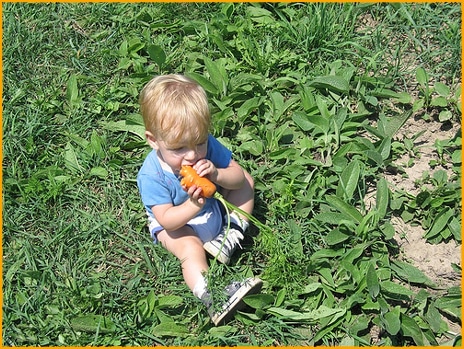
We have been looking at some ideas about kids and gardening, schools, and childhood obesity, and the relationships between them. Many people are upset about school lunches, which sometimes involve such undesirable elements as vending machines, fast-food franchises, and microwaved meals.
No one would deny that kids need to eat fresh vegetables and fruit, even if they eat a certain amount of junk too. And there is always a chance that if their little tummies are full of healthy food, the kids will be less motivated to go out looking for junk food. Either way, they have better overall fitness and less obesity, and the public health picture looks more rosy.
Astonishingly, a program has been shown to increase the voluntary consumption of fresh produce by children: garden-based nutrition education (Microsoft Word doc). We found a University of California document online, “Nutrition — Lead Sentences and Supporting Data.” Although the title is dull, the content is absolutely fascinating. It summarizes the results of several programs, interpreted by several researchers.
In garden-based nutrition programs, organic gardening is wholly integrated into a school’s curriculum and, of course, into the cafeteria. The children grow the food, harvest it, prepare it, and eat it for lunch. They learn “food systems concepts” by tilling the soil, planting the fruits and vegetables, and enjoying the results of their efforts.
To understand why this is so revolutionary, we need to go back to something Dr. Pretlow has learned by collecting responses from actual kids via the Weigh2Rock website. The kids say they are “OD’d” or burned out on the information they get in health class. Vitamins, calories, blah blah blah. Knowing all this, the kids are still helpless against cravings for junk, and they become overweight or obese. They are unable to adjust their behavior, unable to exclude hedonic foods, and encompass the right amount of healthful, fresh foods. Apparently, nutrition education is useless and futile.
Wrong! Garden-based nutrition education shows that information about healthy eating is very useful indeed, if it is presented in the right way — the participatory way. Kids in these programs develop a better attitude about vegetables, and are more willing to experiment with tasting them, and the end result is, they eat twice as much fresh vegetables and fruits as the kids in schools that don’t have this kind of program, which means most schools. The report says,
In contrast, there was no significant increase in fruit or vegetable consumption or nutrient uptake among students who received nutrition education without gardening activities, nor among those who did not receive any nutrition education.
So it isn’t the “what,” it’s the “how.” A program with information + participation will actually succeed in improving children’s diets. There are also other results, such as fewer problems with classroom management and discipline (including less violence). The kids experience an upsurge in pride of accomplishment, a general increase in attention, and an enthusiasm for learning that carries over to the rest of the curriculum as well.
What this adds up to is, less stress for everybody in the classroom, teachers and kids alike. As we know, stress is one factor that leads children to overeat and, in the worst-case scenario, to fall into a state that very much resembles addiction to food. So the relevance to childhood obesity is clear. Stress is one of the childhood obesity culprits. Sometimes it’s a food addiction culprit as well. Stress reduction is important in both preventing and healing food addiction.
Last time, we talked about how stress is relieved by the physical activity of gardening itself. But that’s not all. Getting better grades reduces stress. We’re talking about improved academic performance and better test scores — measurable results like significantly higher grade-point averages in math and science. What else are they saying about garden-based nutrition education, also known as garden-based learning, or GBL?
GBL hands-on-experiences are the best way for students to develop an understanding of their complex world and their place in it.
These kids get smart about the environment, conservation, and ecology. They’re all about stewardship of the Earth and concern for living things. They connect with the world in ways that matter. How does this impact childhood obesity? Glad you asked. In his “Prescription for overweight clients,” Dr. Pretlow recommends,
Find sources of comfort other than food, such as pets, volunteer work, books, hobbies, and clubs.
This is excellent advice for anyone who is recovering from food addiction: Find joy in life, not in food. Find meaning in what you produce, not what you consume; in what you give, not what you get. Discover what you are good at, what you love, something that inspires you to want to get up in the morning. There are many things to be passionate about. There are things to fill yourself with, other than cupcakes and chocolate-covered bacon.
It’s also excellent advice for anyone who wants to avoid becoming obese, and it sounds like GBL has the bases covered.
Your responses and feedback are welcome!
Source: “Nutrition — Lead Sentences and Supporting Data” (Microsoft Word doc), Commserv
Source: “Fighting Addiction,” Therapy Times, 06/27/10
Image by jonny.hunter (Jonny Hunter), used under its Creative Commons license.

 FAQs and Media Requests:
FAQs and Media Requests: 











